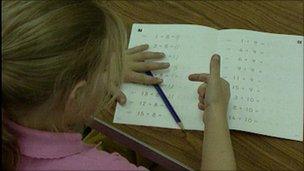How bullet-proof is the schools budget?
- Published

The pupil premium will follow children from poor backgrounds to schools
There may have been sighs of relief when the Chancellor gave the headline news that the schools budget will get an inflation-proofed funding increase.
Compared to most other spending areas - and certainly in relation to universities and further education colleges - this was relatively good news.
But, as the detail emerges, it's clear that many schools in England will receive real terms cuts to their budgets and, as a result, thousands of jobs will be lost.
The reason for this is all down to the pupil premium, which will be a saviour to some but of little help to others.
And - in what might be seen by some as a further case of "squeezing the middle" - it will be schools serving middle-class families that stand to lose the most.
'Flat cash settlement'
So why this gloom when the headline news stated that the schools budget has received an above-inflation increase, albeit of a mere 0.1% a year for the next four years?
The reason is that the schools budget only achieves this minimal growth if you include the new pupil premium within the overall total.
Take away that extra £2.5bn targeted at poorer pupils, and schools are only getting what is called a "flat cash" settlement.
In other words, their income remains steady in cash terms but does not keep pace with inflation.
In short, their spending power will decrease without the addition of the pupil premium.
And here's the key point: the pupil premium is deliberately targeted at schools that teach the most deprived pupils.
Although we do not yet know exactly how the pupil premium will be distributed (a link with the number of pupils eligible for free school meals still looks the most likely), we do know that the whole point of the policy is that the cash will not be spread evenly.
'Job losses'
That is why the leaked Treasury document, which modelled the impact on jobs, suggested that as many as 40,000 teachers' jobs could be lost.
Although those close to the education secretary will not confirm that figure they accept, privately, that there are tough times ahead for schools and there will be job losses.
This reality is likely to lead to some searching questions about the promises that were made about the pupil premium.
Government sources insist that when they promised that the pupil premium would be "additional" money, they simply meant it would be additional to the schools budget.
Indeed the coalition agreement stated: "we will fund a significant premium for disadvantaged pupils from outside the schools budget by reductions in spending elsewhere".
But others took it to mean that the pupil premium would be money that was "additional" to the sums needed to keep pace with inflation.

Extra money from Academy status could be an important cushion ahead
This was a view based on one interpretation of the Liberal Democrat manifesto, which stated that the pupil premium would be "additional money going into the schools budget".
This was reinforced by Lib Dem David Laws, who told me in a BBC Daily Politics Election Debate that the pupil premium would be "new money".
However, even that wording remains ambiguous. If it meant that money would be cut from welfare budgets and moved across to schools, the promise has been fulfilled.
But if it was meant to indicate that the premium would be on top of a schools budget that otherwise rose at least in line inflation, then it has not been delivered.
The result is that, once we see how the pupil premium is distributed to schools, there will be both winners and losers.
Depending on the rate of inflation, some schools could be looking at having to make cuts of around 3% a year for the next four years.
The only thing that will help them is the public sector pay "freeze", which will ease cost pressures on schools by just over £1bn over the spending review period.
One effect of the squeeze on schools - particularly those serving middle-class pupils - could be to encourage more schools to convert to academy status.
Last week I visited Watford Grammar School for Boys, one of 32 'outstanding' schools to have made the switch to academy status by the start of the autumn term.
When I asked the head teacher, Martin Post, why the school was making the change, he was blunt: although greater autonomy was a factor, so too was money.
His school gets an extra £380,000 a year in its budget by becoming an academy, although some of that will have to be spent on services that were previously provided by the local authority,
But for Watford Grammar - prudently anticipating the financial chill - that extra money will be an important cushion in the years ahead.
So, for schools that are unlikely to be big beneficiaries of the Pupil Premium, the academy route might look an increasingly inviting option just to mitigate the impact of the new, harsher funding climate.
Mike Baker, external is a freelance journalist and broadcaster specialising in education.
- Published22 October 2010
- Published20 October 2010
- Published18 October 2010